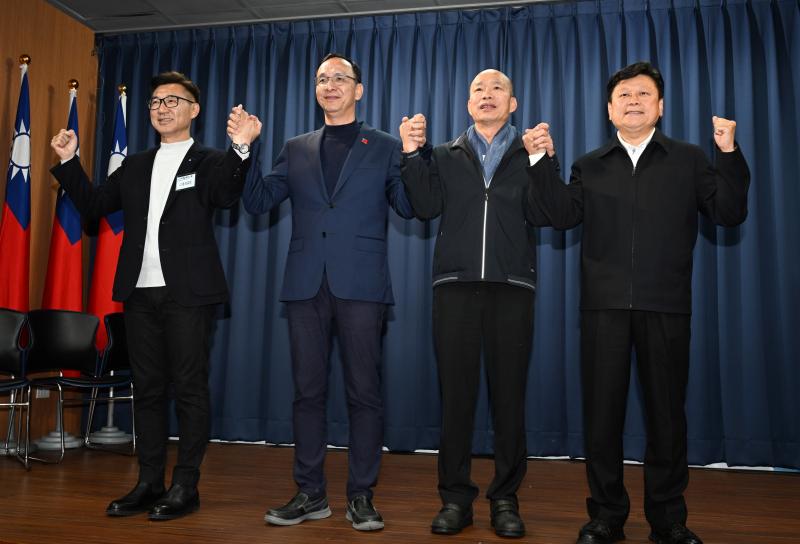Chinese Nationalist Party (KMT) legislator-elect Fu Kun-chi (傅崐萁) on Monday rescinded his candidacy for legislative speaker, removing the last challenge to former Kaohsiung mayor Han Kuo-yu (韓國瑜) and Legislator Johnny Chiang (江啟臣) before the party formalizes its ticket on Wednesday.
The announcement was a turnaround from the day before, when the former Hualien County commissioner held a news conference doubling down on his intention to run and outlining his platform.
Even before the news conference, KMT Chairman Eric Chu (朱立倫) had already given his support to Han and Chiang to run as speaker and deputy speaker respectively.

Photo: Tien Yu-hua, Taipei Times
The party on Monday held a meeting with its newly elected legislators, concluding in the change of heart by Fu.
“My personal honor is not important, it’s about improving the legislature,” Fu said.
Saying there was only one way to unite the party at this time, Fu endorsed the Han-Chiang ticket as the party’s consensus for the most competitive and robust option.
Chu thanked Fu for supporting Han and Chiang, who are to be formally nominated by the party on Wednesday.
Voting for the new speaker and deputy speaker is scheduled for Thursday next week, the first day of the new legislature.

A magnitude 4.9 earthquake struck off Tainan at 11:47am today, the Central Weather Administration (CWA) said. The hypocenter was 32.3km northeast of Tainan City Hall at a depth of 7.3km, CWA data showed. The intensity of the quake, which gauges the actual effect of a seismic event, measured 4 in Tainan and Chiayi County on Taiwan's seven-tier intensity scale, the data showed. The quake had an intensity of 3 in Chiayi City and County, and Yunlin County, while it was measured as 2 in Kaohsiung, Nantou County, Changhua County, Taitung County and offshore Penghu County, the data showed. There were no immediate reports of

‘DENIAL DEFENSE’: The US would increase its military presence with uncrewed ships, and submarines, while boosting defense in the Indo-Pacific, a Pete Hegseth memo said The US is reorienting its military strategy to focus primarily on deterring a potential Chinese invasion of Taiwan, a memo signed by US Secretary of Defense Pete Hegseth showed. The memo also called on Taiwan to increase its defense spending. The document, known as the “Interim National Defense Strategic Guidance,” was distributed this month and detailed the national defense plans of US President Donald Trump’s administration, an article in the Washington Post said on Saturday. It outlines how the US can prepare for a potential war with China and defend itself from threats in the “near abroad,” including Greenland and the Panama

The Chinese Nationalist Party (KMT) is maintaining close ties with Beijing, the Democratic Progressive Party (DPP) said yesterday, hours after a new round of Chinese military drills in the Taiwan Strait began. Political parties in a democracy have a responsibility to be loyal to the nation and defend its sovereignty, DPP spokesman Justin Wu (吳崢) told a news conference in Taipei. His comments came hours after Beijing announced via Chinese state media that the Chinese People’s Liberation Army’s Eastern Theater Command was holding large-scale drills simulating a multi-pronged attack on Taiwan. Contrary to the KMT’s claims that it is staunchly anti-communist, KMT Deputy

RESPONSE: The government would investigate incidents of Taiwanese entertainers in China promoting CCP propaganda online in contravention of the law, the source said Taiwanese entertainers living in China who are found to have contravened cross-strait regulations or collaborated with the Chinese Communist Party (CCP) could be subject to fines, a source said on Sunday. Several Taiwanese entertainers have posted on the social media platform Sina Weibo saying that Taiwan “must be returned” to China, and sharing news articles from Chinese state media. In response, the Mainland Affairs Council (MAC) has asked the Ministry of Culture to investigate whether the entertainers had contravened any laws, and asked for them to be questioned upon their return to Taiwan, an official familiar with the matter said. To curb repeated